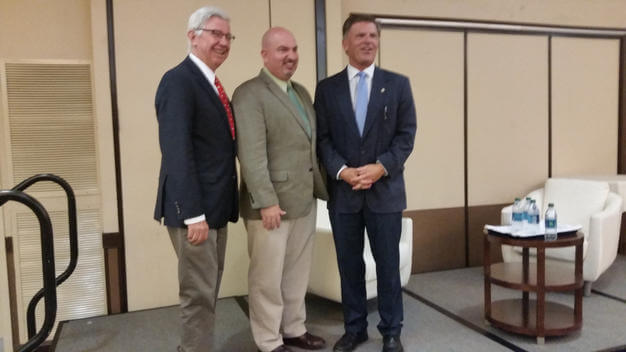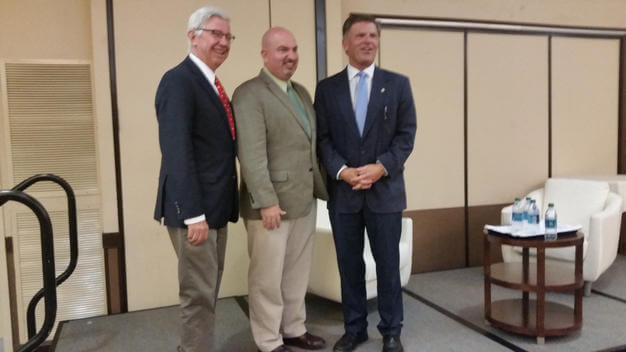One Conference, Three Governors

Three of Maryland’s five living governors appeared at a Maryland Chamber of Commerce conference Thursday in Columbia.
None made news.
But the incumbent, Gov. Lawrence J. Hogan Jr. (R), offered the slightest glimpse into his plans for a second term if he is reelected. And appearing together, former Govs. Parris N. Glendening (D) and Robert L. Ehrlich Jr. (R) denounced the current state of political affairs nationally.

Former Govs. Parris N. Glendening (left) and Robert L. Ehrlich Jr. (right) with Bryan P. Sears of The Daily Record, who led a discussion with the two ex-officials Thursday at a Maryland Chamber of Commerce conference. Photo by Josh Kurtz
Sitting for a friendly Q&A session led by Baltimore radio host and former state legislator Clarence M. Mitchell IV, Hogan repeated his standard lines about the state’s improvements during his four years as governor, particularly on the business front.
“Maryland was way off track and moving in the wrong direction,” Hogan said.
The governor threw out a lot of numbers during his conversation with Mitchell – the 850 “job-killing regulations” he’s cut, the 250 fees he’s reduced or eliminated, the $1.2 billion in tax cuts he’s enacted, the $25 billion he’s spent on education – and his 76 percent job approval rating.
Throughout the campaign, Hogan has steered away from offering many specifics about what a second term would look like, but asked twice by Mitchell about another four years, the governor said he would continue to try to push more tax incentives for businesses and individuals.
“I’m a huge believer in a carrot rather than a stick approach,” he said.
Later, asked again to look ahead, Hogan replied, “Much of it is, we’re going to continue in much the same direction.” He listed more tax relief, more job training, more tax credits, more regulatory reform, and a follow-through on major transportation projects as his top priorities.
“I think that Maryland’s business future is brighter than its past,” Hogan said.
Asked by a member of the audience why some of the policy proposals of his Democratic challenger, former NAACP president Benjamin T. Jealous, are popular in public polling, Hogan suggested that voters haven’t considered their cost.
“Some of the ideas, they do sound good and some of the things we want to strive for,” he said. “…The end results, they sound good. But [voters] don’t know how to get there.”
Hogan assured the audience that his campaign is working hard to “educate” the voters about the cost of Jealous’ positions, like single-payer health care, free public college, and a $15 an hour minimum wage. He noted that the same polls that show support for Jealous’ ideas also show him winning reelection handily.
“It looks like we’re doing pretty well so far,” he said.
Earlier in the day, Ehrlich, who served as governor from 2003 to 2007, and Glendening (1995-2003) dissected the state of American politics and policymaking. Both decried extreme partisanship that’s been exacerbated by gerrymandering, cable news, 24-hour talk radio and social media.
But both also suggested that partisanship is understandable and sometimes unavoidable.
“The bottom line is, when free people fight over power, it’s never pretty,” Ehrlich said. “So let’s not pretend it’s new.”
Glendening, whose political career launched in the early 1970’s, and Ehrlich, who was first elected in 1986, lamented the days when elected officials could argue vigorously over policy but remain friends. Ehrlich said that younger politicians no longer seem to know their place.
“My advice when I got to the legislature, 28 years old, was, ‘Shut up. Shut up! For the first two years, just sit there and listen.’”
Glendening said that Democrats have become more strident in recent years in reaction to some of the policies national Republicans are trying to enact, specifically noting the Trump administration scale-back of environmental regulations.
“I’m old fashioned,” he said. “I like clean air. I like clean water. I like the Bay.”
But Glendening, who said he has known Hogan since the 1970’s, said many Maryland Republican politicians are more centrist than their counterparts at the national level.
“The Republican leadership – whether it’s for expediency or legitimate belief – is very, very moderate compared to what you’re seeing in other states,” he said.
Hogan, who frequently touts his bipartisanship, could not have put it much better himself.




 Creative Commons Attribution
Creative Commons Attribution